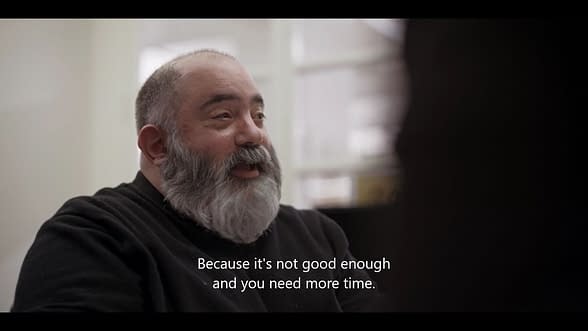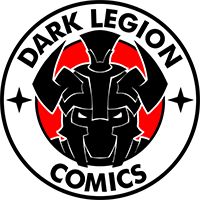Marvel Does a Brutal Take Down of Its Own Lead Writer

Human potato Dan Slott was the center piece of SAVAGE hit piece by… Disney Plus?!?!
There is a new documentary series on Disney’s premier and unwatched streaming service called Marvel 616. The title refers to their main timeline of Earth 616, as opposed to DC’s more solipsistic, Earth One. Mostly, this docu-series is about things like cosplay, Marvel Comics’ impact on other cultures, and the 1970s Japanese Spiderman TV series. (Which I thought was going to be the only interesting thing on the whole series. My mistake!).
Episode seven was called the Marvel Method, and it was focused on the creative process behind the first issue of Iron Man 2020. The show spotlighted the lead writer Dan Slott.
For those who aren’t familiar with this poison dwarf, Dan Slott is a writer at Marvel Comics who has been in the business for decades, and god it shows. He is drastically entitled and ludicrously full of himself. The man is a complete Gamma male in every way available to him. A secret King who thinks the secret is out. He is one of the guys that made Comicsgate what it was when that first broke. He seems to do most of his writing on Twitter these days and his favorite subject is how everyone who voted for Trump is a racist Nazi.
Let’s be clear about this, what happens to him on this show couldn’t have happened to a nicer guy. The humiliation he underwent after this documentary was streamed is deeply, deeply deserved.
“We use the term ‘work’ loosely when it comes to Dan.” That’s his boss Tom Brevoort, the guy who hired him, saying that!
Slott apparently cannot meet a deadline to save his life. Iron Man 2020 has a ship date that has to be met. Everyone at Marvel clearly feels this huge pressure to get this pamphlet out there on time, except Dan Slott.
Show opens with Slott in this dark cavern of creation, wrestling over the first paragraph. OK, every writer has this problem. Those first words determine whether anyone is going to read the rest of your work or not. So, you see Slott struggling for a bit, and then his phone chirps at him. “Oh, a Tweet!”
They showed that. They made a reenactment of his creative process. And included it being interrupted by a Tweet! Which is clearly a big part of writing for Dan Slott.
If you are a creative professional, you have no idea how unprofessional this is. I have literally broken a bone in my wrist pounding on the desk in frustration because of a stupid interruption when I was in the throes of conception. And this writer, who has been in the business for decades, can’t be bothered to turn off his phone?!?!
We see the intro sequence and then we are treated to Slott waddling around New York going on about how great New York City is. And how fantastic his job is.
Then we get to see an interview sequence with his boss, Tom Brevoort. “Dan’s terrible with his deadlines.”
Obviously. This entire show is about his complete and total inability to get a script in on time. And Slott is proud of it!
Brevoort is in the middle of a sit-down with his Golden Boy. “So, I know you’ve got a lot of ideas and very little actually put together.”
Slott fumblingly admits this.
This is 6 weeks out from when the book ships.
“…And you need more time (to get it done).”
The Marvel Method of comic book writing was created by Stan Lee, and basically, it consists of breaking down a story into 20 pages. Just a narrative description of the plot. This outline is then sent to the artist who interprets what was on each page into panels and then the book is sent back to the writer so he can do the dialogue. The Marvel method worked fine when it was Stan Lee and Jack Kirby. These days it’s been largely abandoned inside of Marvel in favor of everyone working from a whole, completed script.
For whatever reason Dan Slott is still allowed to use this method that’s been abandoned by the rest of the company, due to its inherent inefficiency.
“Dan is behind where I need him on his various assignments. I can’t really start on episode two, until episode one is more solid.” Brevoort moans.
Well, you hired him, asshole. You knew what you were getting. A well past his prime, mid-tier writer, who will only work (if you can call it that) when he can utilize an obsolete model. And he can’t pay attention to work because he is continually distracted by social media.
Brevoort: I needed another writer to do the dialoguing on the book.
Enter the real hero of the story, Christos Gage. This is the guy that did the dialogue for the book.
Gage: The only reason to have a co-writer is when the whole is going to be greater than the sum of its parts. But really, I’m Dan’s deadline helper. (awkward laugh)
Every time someone is massively put behind the power curve by this bald hairy goblin, they have to give an awkward laugh. There are so many, many awkward laughs in this show.
We see Dan Slott again, praising Christos Gage as an equal partner. OK, this is a complete load of BS. The plotting is the easiest part of the creative process. It’s also the most fun. Gage on the other hand is the guy that is carrying 75% of the burden of getting this thing done because Tom Brevoort’s rock star comic book writer is too busy screwing around on Twitter to get the job done. And Gage has clearly been brought in at the last minute to do it.
The guy on the bottom rung of the Marvel Method ladder is the “letterer.” this is the guy that fits the dialogue into the word bubbles. And all that Dan Slott’s letterer can do is stare in horror at a screen with artwork on it because he has no dialogue at all to insert. “I’m usually waiting longer than I am from anyone else… I’m always sending a text or emailing begging and pleading someone please send me some script!!!” (awkward laugh)
It ends with Dan Slott doing a massive signing. Everyone else on this documentary was breaking their backs trying to get this book, (that was drastically behind the power curve because of this slob) into the comic book shops on time. And the guy that put them in this position is doing a victory lap and taking all the credit for their work!
Final questions: was this a deliberate hit job by Disney on Marvel Comics?
Was this battlefield preparation?
A way to soften the blow for fans, when Mickey the Great and Terrible finally tells everyone at Marvel, go home, it’s over, you’re done now, we’re just licensing everything out from now on?
Was it a way of saying, “guys you won’t be missing all that much when you really think about it?”
Could Mickey really be that evil?
(awkward laugh)

